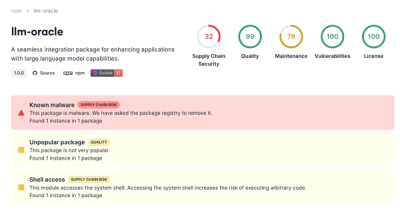
Security News
Python Overtakes JavaScript as Top Programming Language on GitHub
Python becomes GitHub's top language in 2024, driven by AI and data science projects, while AI-powered security tools are gaining adoption.
eslint-plugin-array-func
Advanced tools
Rules for Array functions and methods.
Install ESLint either locally or globally.
$ npm install -D eslint
If you installed ESLint globally, you have to install the array-func plugin globally too. Otherwise, install it locally.
$ npm install -D eslint-plugin-array-func
from-mapPrefer using the mapFn callback of Array.from over an immediate .map() call on the Array.from result.
Array.from has a mapFn callback that lets you map the items of the iterable to an array like you would with .map() except that values have not yet been truncated to fit types allowed in an array. Some iterables can't be directly converted to an array and thus have to be iterated either way. In that case using the mapping callback of Array.from avoids an iteration. See also MDN for an explanation of the potential benefits of using the mapping callback of Array.from directly.
This rule is auto fixable. It will produce nested function calls if you use the Array.from map callback and have a .map() call following it.
Code that triggers this rule:
Array.from(iterable).map((t) => t.id);
Array.from(iterable, (t) => t.id).map((id) => id[0]);
Code that doesn't trigger this rule:
Array.from(iterable, (t) => t.id);
Array.from(iterable, function(t) { this.format(t); }, this);
const arr = Array.from(iterable);
const mappedArray = arr.map((t) => t.id);
no-unnecessary-this-argAvoid the this parameter when providing arrow function as callback in array functions.
The this parameter is useless when providing arrow functions, since the this of arrow functions can not be rebound, thus the parameter has no effect.
The fix is usually to omit the parameter. The Array methods can't be auto-fixed, since the detection of array methods is not confident enough to know that the method is being called on an array.
from (fixable)everyfilterfindfindIndexforEachmapsomeCode that triggers this rule:
const array = Array.from("example", (char) => char.charCodeAt(0), this);
const e = array.find((char) => char === 101, this);
const exampleAsArray = array.map((char) => String.fromCharCode(char), this);
const eIndex = array.findIndex((char) => char === 101, this);
const containsE = array.some((char) => char === 101, this);
const isOnlyE = array.every((char) => char === 101, this);
const onlyEs = array.filter((char) => char === 101, this);
array.forEach((char) => console.log(char), this);
Code that doesn't trigger this rule:
const array = Array.from("example", (char) => char.charCodeAt(0));
const alternateArray = Array.from("example", function(char) {
return char.charCodeAt(this)
}, 0);
const e = array.find((char) => char === 101);
const exampleAsArray = array.map((char) => String.fromCharCode(char));
const eIndex = array.findIndex((char) => char === 101);
const containsE = array.some((char) => char === 101);
const isOnlyE = array.every((char) => char === 101);
const onlyEs = array.filter(function(char) {
return char === this
}, 101);
array.forEach(function(char) {
this.log(char);
}, console);
array.filter(this.isGood, this);
prefer-array-fromUse Array.from instead of [...iterable] for performance benefits.
This rule is auto fixable.
Code that triggers this rule:
const iterable = [..."string"];
const arrayCopy = [...iterable];
Code that doesn't trigger this rule:
const array = [1, 2, 3];
const extendedArray = [0, ...array];
const arrayCopy = Array.from(array);
const characterArray = Array.from("string");
avoid-reverseAvoid reversing the array and running a method on it if there is an equivalent of the method operating on the array from the other end.
There are two operations with such equivalents: indexOf with lastIndexOf and
reduce with reduceRight.
This rule is auto fixable.
Code that triggers this rule:
const lastIndex = array.reverse().indexOf(1);
const firstIndex = array.reverse().lastIndexOf(1);
const sum = array.reverse().reduce((p, c) => p + c, 0);
const reverseSum = array.reverse().reduceRight((p, c) => p + c, 0);
Code that doesn't trigger this rule:
const lastIndex = array.lastIndexOf(1);
const firstIndex = array.indexOf(1);
const sum = array.reduce((p, c) => p + c, 0);
const reverseSum = array.reduceRight((p, c) => p + c, 0);
const reverseArray = array.reverse();
const reverseMap = array.reverse().map((r) => r + 1);
array-func/recommended ConfigurationThe recommended configuration will set your parser ECMA Version to 2015, since that's when the Array functions and methods were added.
| Rule | Error level | Fixable |
|---|---|---|
from-map | Error | Yes |
no-unnecessary-this-arg | Error | Sometimes |
prefer-array-from | Error | Yes |
avoid-reverse | Error | Yes |
To enable this configuration use the extends property in your .eslintrc.json config file (may look different for other config file styles):
{
"extends": [
"array-func/recommended"
]
}
The array-func plugin is licensed under the MIT License.
FAQs
Rules dealing with Array functions and methods.
The npm package eslint-plugin-array-func receives a total of 56,112 weekly downloads. As such, eslint-plugin-array-func popularity was classified as popular.
We found that eslint-plugin-array-func demonstrated a healthy version release cadence and project activity because the last version was released less than a year ago. It has 1 open source maintainer collaborating on the project.
Did you know?

Socket for GitHub automatically highlights issues in each pull request and monitors the health of all your open source dependencies. Discover the contents of your packages and block harmful activity before you install or update your dependencies.

Security News
Python becomes GitHub's top language in 2024, driven by AI and data science projects, while AI-powered security tools are gaining adoption.

Security News
Dutch National Police and FBI dismantle Redline and Meta infostealer malware-as-a-service operations in Operation Magnus, seizing servers and source code.

Research
Security News
Socket is tracking a new trend where malicious actors are now exploiting the popularity of LLM research to spread malware through seemingly useful open source packages.